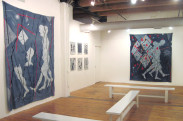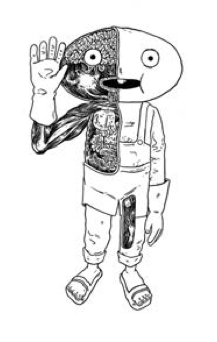
by Alessandra Stamper

The first recognition I read in a book. Something is irregular about these figures, what the words don’t come out and say. They wear buttoned-up pinstriped shirts. They ring female, yet not women. Not mothers or teachers or girlfriends or nuns. (Old-world queer, as in off, odd, awry, but do I mean their bodies or just the angle of view the author gave me to see? Did they wear ties and smoke cigars? Did they watch with falcon eyes? Did they wait in the shadows around the corner, pulling the collars of their peacoats closed as the wind rattled the alley trash? Were they waiting for cabs or friends or their time to arrive? Did I read about these odd bodies or just hope for them, the way some children imagine talking dolls and crystal cities and that friend nobody else can see? Some say queerness, in the new way of the word, is less description than hope, but how do we wait for what we don’t yet know?)
At age seven I sit in my room at the corner of 142nd and Emerald Avenue. I am alone except for my dolls, lined up on a bench under the windowsill. A redhead in a lacy dress and plastic Mary Jane shoes and a tape recorder in her neck. A housewifey blond in a blue cotton frock, who with enough batteries is able to walk a bit, slow rocking monster steps, before she tips over. A baby doll in red cotton overalls with a stiff blond pixie. (Something was off about the dolls as well. Their hair was not pretty enough and their eyes were askew. I would find them, years later, when moving, in a box in my basement, and wonder at the baby’s matted hair, the leg pulled out of the redhead’s hip socket, the smudges on the little housewife’s puffed cheeks, and I would remember that I never did know how to play.)
From my childhood window: the steel latticework of the powerlines across the street, the truck smoke of South Side Halsted Avenue just visible over the alley to my left, the clank of whistles and freight north and west, just out of sight. Our block: a purgatory, brownstone and backyard neighborhood to the south, to the north the tracks, mills, truck routes, smokestacks. Sometimes, from my bedroom, either asleep or awake, I see a girl out there, small and filmy, like my housewifey doll but with neater hair, banana- curled like mine was once. She is short and bare-kneed, legs sturdy as my walking doll’s legs. She won’t speak to me. She stands in our yard overgrown into prairie, green stalks taller than the fence, her face obscured, her eyes watching through.
(This girl could not have been in our yard. My father mowed. Everyone’s father mowed, the lawns tight as crew cuts. We did not then yet miss the old Illinois tall grass, still there beneath all our homes, its wild growth kept clipped. And yet I remember this girl who does not belong in my memories better than I remember how my own brothers looked at that age. I’ve written and erased her so many times since. Where do I put her? Sometimes I remember her not in this house on the corner of Emerald Avenue but a few blocks north, in the townhouse where we lived before, my mute companion, an imaginary watcher who kept coming to me, into the gaps between my books, my scuffed dolls, my solitudes.)
What can I name the girl who can’t be but is here? I approach, but she doesn’t beckon. She is not soft, I can see that much from here. She is the one with falcon eyes, circling without name, without center. On Emerald. In Emerald. (I lived in language that diverged from this brownstone street named first— long before we, the Croats and Poles, arrived—by Irish immigrants, after their left-behind Emerald Isle, this new Ireland. The hope of renaming. A wish.)
We pass each other now, the prairie girl, the ones in pinstriped shirts, on streets, on trains, in shopping malls, sharing our irregular recognition. (If that odd girl in the grass was me, if those others were the ones who would be my friends and lovers, then this is a good story of finding and re-centering, of teaching each other how to play. But just this?) We rename ourselves. We rename our renamings. Yet what I want from that girl in the grass is not just language.
I look out my window, another side of the same city. Rooftops, snow, another moving truck, another ambulance at the nursing home next door. (Desire has never been arrival. Hope has always been a slippery horizon.) That girl is no longer a child. Grownup, her hair is shorn, her stomach is muscle, she’s wearing heavy boots, and the biggest change is she’s beckoning now. Come this way. (Desire has always been slant and green.)
Barrie Jean Borich is the author of Body Geographic(University of Nebraska Press/American Lives Series), winner of a Lambda Literary Award in Memoir and an IPPY (Independent Publisher Book Award) Gold Medal in Essay/Creative Nonfiction. Her previous book, My Lesbian Husband (Graywolf), won the ALA Stonewall Book Award. Her work has been cited in Best American Essaysand Best American Non-Required Reading and she’s currently working on a book-length essay about repurposed industrial landscapes, urban joy, and riding her bicycle on the mean streets of Chicago. Borich was the first creative nonfiction editor of Hamline University’sWater~Stone Review and is currently a member of the creative writing faculty of the English Department/MA in Writing & Publishing Program at Chicago’s DePaul University, where she’s developing Slag Glass City, a creative nonfiction and new media journal focused on sustainability, identity and the arts in urban environments. Borich earned her MFA from the Rainier Writing Workshop and lives now with her spouse Linnea, a few blocks from Lake Michigan, in the Boystown neighborhood of Chicago, which was recently voted the most “incomparable” gayborhood in the world.
David Alvarado is an illustrator and cartoonist. Growing up in the Chicago land suburbs he was always drawn to cartoon imiagry, chicago imagists and hand painted signs. After gradutating from Columbia College Chicago he has worked primarly in edditorial illustration for various magazines and newspapers, as well as creating comics for publications and character designs.For commission and project inquiries, visit hello-david.com.















click to see who
MAKE Magazine Publisher MAKE Literary Productions Managing Editor Chamandeep Bains Assistant Managing Editor and Web Editor Kenneth Guay Fiction Editor Kamilah Foreman Nonfiction Editor Jessica Anne Poetry Editor Joel Craig Intercambio Poetry Editor Daniel Borzutzky Intercambio Prose Editor Brenda Lozano Latin American Art Portfolio Editor Alejandro Almanza Pereda Reviews Editor Mark Molloy Portfolio Art Editor Sarah Kramer Creative Director Joshua Hauth, Hauthwares Webmaster Johnathan Crawford Proofreader/Copy Editor Sarah Kramer Associate Fiction Editors LC Fiore, Jim Kourlas, Kerstin Schaars Contributing Editors Kyle Beachy, Steffi Drewes, Katie Geha, Kathleen Rooney Social Media Coordinator Jennifer De Poorter
MAKE Literary Productions, NFP Co-directors, Sarah Dodson and Joel Craig